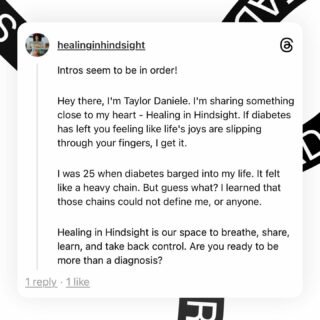You read the title right. In this episode, I break down what causes dawn phenomenon and different ways I try to keep my blood sugar stable throughout the night. As a new CGM owner, I don’t want my alarm going off right when I need to get sleep. Because as you know EVERYTHING can impact your blood sugar.
KEY POINTS
- Let’s break it down: What is Dawn Phenomenon?
- My personal experience
- How to adjust for stable numbers
Find more at www.healinginhindsight.com
Connect
- Instagram @healinginhindsight
- Facebook.com/healinginhindsight
- YouTube: Healing in Hindsight™
- Want to be on the show? Lets chat!
Healing in Hindsight™ is managed by host
Taylor Daniele™ and Produced by We Are 8 Studios
Transcript
What's up everybody.
Taylor:Welcome back to another episode of healing.
Taylor:In hindsight, your no BS source for thriving with diabetes.
Taylor:It's me again, Taylor.
Taylor:Daniele, I hope you guys are having a good day.
Taylor:I am , feeling kind of moody.
Taylor:That's why I have this, this lip going.
Taylor:I know it's like spring, but I tend to, I don't really follow seasonal trends.
Taylor:I'm definitely the person who aware, boots in the summer.
Taylor:I know that there were particular colors for fall and spring, but I
Taylor:tend to wear fall colors year round, fall, winter colors year anyways.
Taylor:I know I'm not the only person, but , yeah, I, so today's episode is it's funny.
Taylor:Cause I liked the title because it's kind of, it's similar, like a dirty
Taylor:joke, but that's not your thing.
Taylor:Sorry, not really.
Taylor:Sorry.
Taylor:It's funny to me.
Taylor:But I think it's something that is going to be, kind of interesting
Taylor:for , non-diabetic friends.
Taylor:I know definitely diabetic friends and I know the men kind of get it cause you
Taylor:don't really ask for this to happen.
Taylor:I don't think , and that's talking about high blood sugar numbers in the
Taylor:mornings, which is called dawn phenomenon.
Taylor:Or as I like to call it diabetic morning wood know.
Taylor:What can I say, I'm, I'm corny, but you know, it's a thing, it's a thing.
Taylor:And when I got my CGM, I actually started really noticing when it happened, because
Taylor:I would start to have alarms and there's technically two different types of, ways
Taylor:that you can end up with higher numbers in the mornings, but I'll get into that.
Taylor:But I really don't want to talk about, what it is.
Taylor:Why it happens and how we can kind of get a handle on it, or at least what
Taylor:I've been doing to try and, ease my spirits whenever I get up in the morning.
Taylor:And I check my numbers because it's a little defeating when you're trying to be
Taylor:in range and you wake up and you have not eaten a thing and your numbers are crazy.
Taylor:So let's get into it.
Taylor:all right.
Taylor:So diabetic morning would let's.
Taylor:Talk about it.
Taylor:It's, it's such an interesting thing.
Taylor:You, you are diagnosed with this and I don't feel like I really would have
Taylor:understood this , until I got my CGM, like I knew it was happening, but I really
Taylor:just thought it was something I was doing.
Taylor:Wrong.
Taylor:I really thought that I was just, not doing well.
Taylor:There were some mornings where I did have good numbers, but it was
Taylor:like I had to either super early or not at all the night before.
Taylor:And I'm taking my medication at weird times to try to like,
Taylor:outbeat my morning numbers.
Taylor:It's, it's a whole crazy thing.
Taylor:So let's, let's break it down.
Taylor:What is Dawn phenomenon as what it's called?
Taylor:So it's basically, while you're sleeping.
Taylor:Your body doesn't need as much energy.
Taylor:Right?
Taylor:And so when you're about to wake up, it gets ready to burn fuel because
Taylor:it needs energy for you to wake up.
Taylor:Right?
Taylor:So it starts to tell your liver to start releasing more glucose, and
Taylor:then that triggers your body to release the insulin because insulin
Taylor:is what you need to use the glucose.
Taylor:But as a diabetic, you usually don't need more glucose in your system at
Taylor:the time, because you probably don't have enough insulin in your system.
Taylor:Either because you can't make it because you need to manually inject
Taylor:it for like my type one folks or you're really resistant to it.
Taylor:So it's not that your body doesn't make it.
Taylor:It's just really hard for yourselves to accept it and absorb it.
Taylor:Right?
Taylor:So that leads to just a bunch of glucose floating around in your system.
Taylor:And you're not able to actually absorb anything for your
Taylor:blood sugar levels stabilized.
Taylor:So that equates to crazy numbers in the mornings.
Taylor:And it typically happens between 3:00 AM and 8:00 AM.
Taylor:And at first.
Taylor:I was like, Hmm.
Taylor:Maybe it's just like, something that I'm doing.
Taylor:And I used to be , a middle of the night snacker.
Taylor:And so I'm like, Oh, it's clearly because I'm doing that.
Taylor:But since having my CGM , I have realized 100% that it's, it's definitely a thing.
Taylor:Now, when I was doing the fingerprint glucose meter, I was definitely
Taylor:having crazy numbers in the mornings.
Taylor:And.
Taylor:My dad actually told me, kind of broke this down for me because my grandmother
Taylor:who also is diabetic , was having the same thing and she was really
Taylor:stressing out about her morning numbers.
Taylor:And it's just like, your body goes through this whole wake-up process.
Taylor:And it's just, it's just what it does.
Taylor:There's no way for your body to know fully like, Oh, Hey, so.
Taylor:We're having trouble with, utilizing insulin.
Taylor:So I probably shouldn't start dumping out glucose around this
Taylor:time, because I know that you either manually need to give me some insulin
Taylor:or you're having some resistance.
Taylor:So I need to kind of back off doesn't know that at all.
Taylor:It just continues to do its normal programmed function and
Taylor:it, it kinda messes with this.
Taylor:Right.
Taylor:So my dad was telling me like, because we know that this happens like.
Taylor:Don't take your morning numbers to equate to something that you like, you're just
Taylor:a terrible person or something like that.
Taylor:It's just part of the process and, maybe check a little bit later, or whatever.
Taylor:But then at that point I've eaten, so it's like, okay, well maybe I should
Taylor:check maybe after my first meal to see I'm trending back down, whatever.
Taylor:But when I, my first.
Taylor:My first two weeks with my CGM, especially the very first week.
Taylor:Now, mind you, I'm in the midst of utilizing two different medications.
Taylor:Okay.
Taylor:So when I got my CGM, I got it in the middle of the week.
Taylor:And so I wanted to make sure from a changing sensor kind of thing, I started
Taylor:it fresh , on a Sunday or Monday , I ended up going with the Sunday, cause
Taylor:that's when I also take my ozempic shot.
Taylor:That I was also recently prescribed , that week.
Taylor:So my endocrinologist took me off my kombiglyze extended release and my
Taylor:glipizide extended release, but it was literally the middle of the week.
Taylor:And so I decided to.
Taylor:I don't know, I just like, even, even starts stuff like that.
Taylor:So I finished out using the common glass and glipizide that week.
Taylor:And as I was checking my blood sugar numbers , my numbers were
Taylor:actually pretty good in the morning.
Taylor:So, I start the CGM.
Taylor:Actually, let's see, I got my CGM before I got my new medication with
Taylor:my endocrinologist, so I didn't start my CGM until that Sunday.
Taylor:And then.
Taylor:During that week of my first week of having my CGM, that's when
Taylor:I saw my endocrinologist and he scrapped my current medication
Taylor:regimen and put me on a and
Taylor:So I used my , current, my old medication regimen while going through my first
Taylor:week with my CGM until that Sunday.
Taylor:So I could start my shot and the syndrome, because I don't like switching
Taylor:stuff in the middle of the week.
Taylor:So.
Taylor:I'm wearing my CGM and still taking common glides and glipizide.
Taylor:And I'm having these weird drops around like three, between three
Taylor:and two and 3:00 AM in the morning.
Taylor:And the alarm on, at least for the freestyle, you can adjust the.
Taylor:High glucose number, basically.
Taylor:So when, when do you want it to be when your blood sugars, your, I
Taylor:think it defaults from 70 to 180.
Taylor:I've now changed it to 70 to one 60 because I was doing really well in range.
Taylor:So I just slowly was taking it down.
Taylor:I think the, the standard for someone who's non-diabetic is like
Taylor:70 to 140, so I'm slowly bringing it down so I can keep myself in
Taylor:range and the alarms really do help.
Taylor:They really do so.
Taylor:The low blood sugar though.
Taylor:I don't, I don't feel my lows until I'm in like low 60 high fifties.
Taylor:When I'm in the mid sixties to seventies, I don't really feel it.
Taylor:And I don't, I don't have that.
Taylor:The symptoms, when I get into like the 50 random, like high fifties,
Taylor:that's when I started to feel the symptoms, but I usually don't
Taylor:let myself get that far, but.
Taylor:This particular CGM will not let me adjust it to like 65.
Taylor:I tried to do that, but it flipped it back to 70.
Taylor:So I was hitting under 70, around 2 to 3:00 AM and my alarm was going off.
Taylor:And so I would scan myself and an average between I got between 62 and 69.
Taylor:And I would sit till I felt a really need to grab a snack or, knock back some juice.
Taylor:I have these little applesauce packs do , that I use.
Taylor:And.
Taylor:So I was fine.
Taylor:And actually what I would do is I would sit for like five minutes
Taylor:and it was scammed myself again.
Taylor:And because I was awake and alert because my alarm was going off, my
Taylor:numbers started to take back up.
Taylor:So I think I got like 65, one night.
Taylor:So I S I scan it.
Taylor:I see that it's 65 and then I sit up and I wait, I'm trying to check how I feel
Taylor:if I really am super low and I need to get something, and then I scan it again.
Taylor:And it's already back to 70.
Taylor:And then I'm like, okay.
Taylor:So then I sit a little bit longer.
Taylor:I scan it again and it's giving me the even sign.
Taylor:It doesn't give me that it's necessarily like rising.
Taylor:Like usually what I see after I eat, but it just slowly creeps up.
Taylor:So I lay back down and go back to sleep.
Taylor:And then I wake up like around seven 38 and a scan it again.
Taylor:And it's like at like a hundred something.
Taylor:I'm just like, wait a minute.
Taylor:I haven't had anything in my sister.
Taylor:It's insane.
Taylor:Isn't it?
Taylor:I will say having a CGM, I treat myself like , a product at the
Taylor:grocery store where I'm like scanning myself every five seconds.
Taylor:I'll like find random things and that will not random things, but like when it
Taylor:comes to food, I kind of want to like buy something just to see like what it does.
Taylor:Like, I dunno, CGMs are, it's an whole nother ball game when you can
Taylor:kind of scan in a moment in now.
Taylor:Yeah, I was, I was rising and so.
Taylor:I realized though that, because I kept having the crazy low
Taylor:drops , that I was actually experiencing the same Mogi effect.
Taylor:I hope I'm saying that.
Taylor:Right.
Taylor:S O M O G Y I, and I don't know why the Y and I are together
Taylor:because it makes sense, whatever.
Taylor:Somogyi effect.
Taylor:And that is when you have a really when you have a drop and then because you drop
Taylor:super low , then you have to , either take something or it's because you
Taylor:dropped your body's like, Oh, hurry up.
Taylor:And then it spikes you back up.
Taylor:So even, so it's still kind of like this crazy, crazy thing that.
Taylor:Just the motion of rising sends your numbers up.
Taylor:And that sounds very familiar to other people that I know where just because
Taylor:they're waking up, you have morning wood.
Taylor:I mean, we all know what happens.
Taylor:It's it's it happens.
Taylor:Because I remember asking, I would just be y'all know, real talk here.
Taylor:Right.
Taylor:I would ask my friends like, yo, what is it with?
Taylor:Just.
Taylor:Hey, like do something with that, put that away.
Taylor:Right.
Taylor:And I use that as my guy friends like, why, why is this?
Taylor:Like, it's just, it's just waking up, just rising.
Taylor:The blood is flowing.
Taylor:And so is that, and I'm just like, all right, well, cool.
Taylor:I guess, and it's probably why a lot of women enjoy, morning
Taylor:sex because it's already there.
Taylor:So you might as well utilize it.
Taylor:Right.
Taylor:I don't know.
Taylor:So it's just one of those things that I just thought was kind of funny
Taylor:and yet interesting that happens.
Taylor:I wish that, it was kind of saying like, Hey, I'm getting ready to lay down, so
Taylor:my numbers are gonna start to go down.
Taylor:But it, it, unfortunately doesn't, it's seems to be
Taylor:pertaining mostly in the morning.
Taylor:Now, what I will say is that, I've I've noticed some really interesting
Taylor:numbers even throughout the day where I'm like, I'm literally just sitting
Taylor:and I'll scan and it's a little higher than normal, and I might've scanned
Taylor:it an hour ago and it was fine.
Taylor:So, I think that's also where , at least for us.
Taylor:Getting some form of movement helps to knock that down.
Taylor:I actually played around with, I ate something.
Taylor:It was, I was having a food experiment.
Taylor:I can't remember what it wasn't that I ate , that normally, it was like, you
Taylor:might not want to eat that according to diabetic standards, if you will.
Taylor:And it, it made my blood sugar eyes.
Taylor:And so I remember an episode of elementary the modern Sherlock Holmes, if you will
Taylor:, with , Oh my God, what's her name?
Taylor:She's in Charlie's angels.
Taylor:Lucy, LouLiu there you go.
Taylor:And she, I can't remember, they were working her in Charlotte,
Taylor:we're working on a case and they needed to stay up all night.
Taylor:And she started doing these like squats, like really fast squats.
Taylor:And she, obviously she was playing Watson.
Taylor:She was talking about in med school.
Taylor:That's what she used to do to, her, her blood pumping.
Taylor:And it would keep her awake.
Taylor:So I'm watching TV and I'm doing, working on something and I'm noticing
Taylor:this rise and it's like, it's going up?
Taylor:So I'm like, huh.
Taylor:Okay.
Taylor:So I start doing really fast, just standard standing squats,
Taylor:trying to get my heart rate up.
Taylor:I think I did.
Taylor:Like twists, like, you just, how you stand and just college, your arms twist.
Taylor:And then I did a few high knees and I scanned myself again and sure enough, my
Taylor:blood sugar dropped a couple of points.
Taylor:And so, granted, I.
Taylor:Yeah.
Taylor:I do not like cardio.
Taylor:I do.
Taylor:I do not like Cari.
Taylor:I don't like it.
Taylor:I don't like when my heart feels like it's about to burst out of my chest and, sweat
Taylor:in general, just, it makes me feel gross.
Taylor:It makes my.
Taylor:My hair shrivel, for the curly girls out there.
Taylor:It's, it's just a lot.
Taylor:Okay.
Taylor:I like weights because you don't even realize that your heart rate
Taylor:is going up, but then, it does come down whenever you're resting between.
Taylor:I liked the idea of testing my strength, but cardio is not.
Taylor:A final one.
Taylor:I will say though, I am glad.
Taylor:And I don't know if I should really be glad about this, whatever,
Taylor:but I don't have to run, to kind of get my heart rate up.
Taylor:I just need to do a brisk walk, so I can get on a treadmill hit three.
Taylor:And that keeps me where I am and I'm meeting my heart rate quota for the day.
Taylor:If I do it for at least 30 minutes or so.
Taylor:But it's true.
Taylor:Getting your heart rate going is something that will help.
Taylor:So that leads me to some things that I've been doing to kind of combat that and
Taylor:some things that I've heard others doing, especially for those that take insulin.
Taylor:So.
Taylor:I've heard plenty of people talk about, the same for those who have
Taylor:the Somogyi effect, where you drop really low in the middle of the night.
Taylor:And then you're trying to like, get yourself back up and that's having
Taylor:a, like protein, and a protein snack.
Taylor:Before bed , to kind of help stabilize you , protein and fiber are two things
Taylor:that really protein, fiber and fat , you know, especially when paired with
Taylor:carbs , help slow down the release.
Taylor:It helps make sure that your blood sugar remains stable.
Taylor:So especially if you're having a carb-heavy dinner, definitely
Taylor:make sure you've got some protein, fat and fiber , in it.
Taylor:So that way you're not sending your number skyrocketing simply because , you've
Taylor:had nothing but carbs for dinner.
Taylor:Usually I try to actually keep , even my complex carbs, even though they're,
Taylor:they're definitely good carbs, I try to keep them , to a minimum with my dinner.
Taylor:So I try to, go veggie heavy, those types of carbs , and some
Taylor:form of protein with my dinner.
Taylor:And then like, for those of us who take oral medications , with their dinner.
Taylor:So when I was on kombiglyze, I've had to take two tabs of that with my dinner.
Taylor:But sometimes my dinner would be like around anywhere between six and eight.
Taylor:But I'm not going to bed until like 10 or 11.
Taylor:So I did an experiment with myself when I was still using my meter to
Taylor:try to see if i can, get those numbers low is I ate my dinner earlier.
Taylor:And then I took my medication like right before bed.
Taylor:So like, 10 ten-ish.
Taylor:So I might like eat my dinner around six and then take my medication around 10.
Taylor:So that we, when it was still doing it slow release, it kept me even through
Taylor:the morning that worked a little bit , it was kind of hit or miss.
Taylor:I did try, eating my dinner later , at one point.
Taylor:And then I also tried eating my dinner earlier, but also
Taylor:taking my medication earlier.
Taylor:And it seemed the average that worked was eating my dinner earlier, but taking
Taylor:my medication later seemed to help.
Taylor:I have heard of those who are on insulin , still eating their dinner,
Taylor:but they don't actually take their insulin until right before bed.
Taylor:So that way they have enough in their system.
Taylor:So that way it doesn't like send the body into overdrive and needing to
Taylor:Basically it's when it's dumping, when your liver is dumping the glucose,
Taylor:you have some insulin on standby to help , absorb that up a little bit.
Taylor:So your numbers can be a little bit more even , or not as high.
Taylor:So it's.
Taylor:It's an interesting thing.
Taylor:I really try my best to watch my evening routine , with that, because it's
Taylor:hard to , always think of that, in the mornings now, especially with having a
Taylor:CGM and you can see throughout the day, I don't worry as much when my numbers are
Taylor:higher in the morning, because a, I know what it is now that I know what it is.
Taylor:It's just my body, it's , Like, when a cars, you need to start it after it's
Taylor:been sitting for a minute, it's just, it starts out, the, the engine rev
Taylor:goes a little bit higher than that one.
Taylor:I just remember my dad was telling me once it gets to the one or a little bit
Taylor:below that's when you're ready to pull out when you're warming up your car.
Taylor:Right.
Taylor:So it starts out and engines revving really high.
Taylor:And then after you sit for a few minutes of slowly, just creeps back down, that's
Taylor:pretty much what your body is doing.
Taylor:It's doing the same thing and it's not the most exciting thing in the world.
Taylor:And it's definitely a very frustrating thing because when, part of your
Taylor:, diagnosis is managing numbers , not that we want to, because we have to
Taylor:think about, the numbers on a scale and the numbers , for A1C and now numbers
Taylor:on our blood sugar in the mornings and all these things, I have an exhibit
Taylor:with a lot of numbers and I hate math.
Taylor:Okay.
Taylor:But knowing what it is has definitely helped me adjust and I don't.
Taylor:Freak out as much , when it happens.
Taylor:Cause I understand my body is just doing its natural thing.
Taylor:And that helps me to, prepare for it.
Taylor:Oh, I almost forgot one other thing that you could do that I haven't tried
Taylor:myself yet, but I've read and communicate with other people that they do is doing
Taylor:vigorous exercise in the evenings.
Taylor:Because again, having a higher heart rate will lower your blood sugar.
Taylor:Yeah.
Taylor:So being able to get some exercise in before you lay down could also be helpful.
Taylor:I have not tested this myself.
Taylor:So please at your own will talk with your doctor.
Taylor:Of course, obviously is all general advice, no medical advice here.
Taylor:Just thoughts and experiences.
Taylor:Right.
Taylor:But I prefer to get my workouts in.
Taylor:Preferably in the mornings, I'm starting to , do like midday walks , with my dogs
Taylor:too, just down the street and back , to get me some kind of movement, in the
Taylor:middle of the day, I used to do it when I worked at an office where I would, either
Taylor:on my lunch break, cause I usually would just eat at my desk , or my breaks.
Taylor:I would just walk around the building a couple of times, sometimes I would just
Taylor:have meetings where we would just go outside and walk around to get out of
Taylor:the office and get our blood flowing.
Taylor:So now that I work from home, I'm trying to do that more as well.
Taylor:But evening workouts are just hard for me.
Taylor:I always have something going on, that's what happy hour is, and then I'll be
Taylor:tired, and you can just like go work out and they go like meet up with people.
Taylor:I mean, I guess we're not menial, but people like that, but that
Taylor:was my excuse at the time.
Taylor:I don't know.
Taylor:Maybe I feel like if I had a treadmill in my house, I'd probably
Taylor:be down for an evening walk.
Taylor:My uncle used to do that all the time and they used to live in Waco.
Taylor:They would actually go on night walks.
Taylor:So when I would spend this up, I think it's been a, yeah.
Taylor:When I spent a summer with them, we would go on evening, walks back
Taylor:when, being out at night, wasn't something to be concerned about.
Taylor:So, and it's me by myself.
Taylor:And even though I've got two dogs, like it's too, it's it was, it was more lit
Taylor:where they were, it's kind of dark where I am , even with the streetlights.
Taylor:So I think I will not be doing the evening venture.
Taylor:If I were to go to the gym in the evenings, that's also when most people
Taylor:go to the gym because they're all off of work and crowds and I even.
Taylor:Before pandemic.
Taylor:I did not like when the gym was crowded, I like when it's empty,
Taylor:which is usually why I try to get there in the mornings, because
Taylor:nobody wants to be there that early.
Taylor:I try to be, I try if I can be there right.
Taylor:When they open at 5:00 AM.
Taylor:I will.
Taylor:I've only done it like three times this year, so far.
Taylor:So we'll, we'll see
Taylor:anyways.
Taylor:Well, that's really all that I had for you guys today.
Taylor:We deal with so much and it almost feels like there's a layer upon another
Taylor:layer of something, but the more, the more you can do stuff to prevent it.
Taylor:So I hope this was helpful in some ways, I always feel like I'm saying that , after
Taylor:I talked to you guys, because I want to make sure I'm giving you content.
Taylor:That makes sense.
Taylor:So with that being said, Hey, Apple podcast, Spotify, Google podcasts.
Taylor:Amazon.
Taylor:I keep forgetting them.
Taylor:Amazon has podcasts now, wherever you can leave me some information, insight,
Taylor:whatever, please rate, subscribe, and let me know what you think of the show.
Taylor:Let me know if you have a question and you'd like for me to answer, hit me up
Taylor:on my DMs and Instagram , or feel free to hop over to healinginhindsight.com
Taylor:and shoot me a message.
Taylor:I would definitely love your input on how I can make this more.
Taylor:Relatable to you, because even though I'm sharing what I'm going
Taylor:through, I know many more of you have so many stories to tell.
Taylor:So let me know what you think.
Taylor:If you're watching on, IETV make sure you hit the heart.
Taylor:If you are watching on YouTube, make sure you subscribe all the things.
Taylor:What do they do at the end of all these videos, all the pointing around.
Taylor:I'm not going to do that.
Taylor:Thank you guys for listening.
Taylor:And again, I really appreciate all of your support, encouraging
Taylor:messages and for my fellow diabetics, Peace love and good blood sugars.
Taylor:I'm out.












































